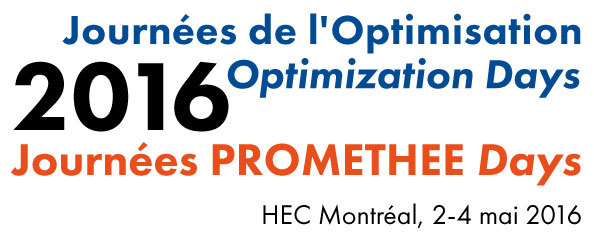
Journées de l'optimisation 2016
HEC Montréal, Québec, Canada, 2 — 4 mai 2016

TB11 Planning, Optimization and Control in Mobile Robotics
3 mai 2016 15h30 – 17h10
Salle: Cogeco
Présidée par Jérôme Le Ny
4 présentations
-
 15h30 - 15h55
15h30 - 15h55Optimal robotic path planning with complex constraints
In this talk we present the language SAT-TSP and the powerful solver, callback-TSP. The language allows a user to express single and multiple robot path planning problems with complex logic constraints. Callback-TSP operates by combining the DPLL(T) framework for solving SAT problems with incremental callbacks to a TSP solver.
-
 15h55 - 16h20
15h55 - 16h20Collaborative control for a SmartWheeler
The SmartWheeler project aims at developing an intelligent wheelchair that
minimizes the effort required for steering and navigation. We have
developed a collaborative control system that uses a Partially Observable
Markov Decision Process to predict the user’s intended destination and
optimize the control action. Preliminary results are presented from
several indoor navigation tasks. -
 16h20 - 16h45
16h20 - 16h45Probabilistic path prediction and planning for 2D target tracking
We consider probabilistic pursuit of a moving target in 2D and the particular problem of probabilistic path prediction of the target's future actions, given limited information on their behavior and goals. We frame the tracking problem as a POMDP, approximately solved through sampling-based planning under topological constraints.
-
 16h45 - 17h10
16h45 - 17h10Motion planning strategies for autonomously mapping 3D structures
We present a system capable of autonomously mapping the visible part of a bounded three dimensional structure using a mobile ground robot equipped with a depth sensor. The emphasis is on accurately reconstructing a 3D model of a structure of moderate size rather than mapping large open environments, with applications for example in architecture, construction and inspection.
